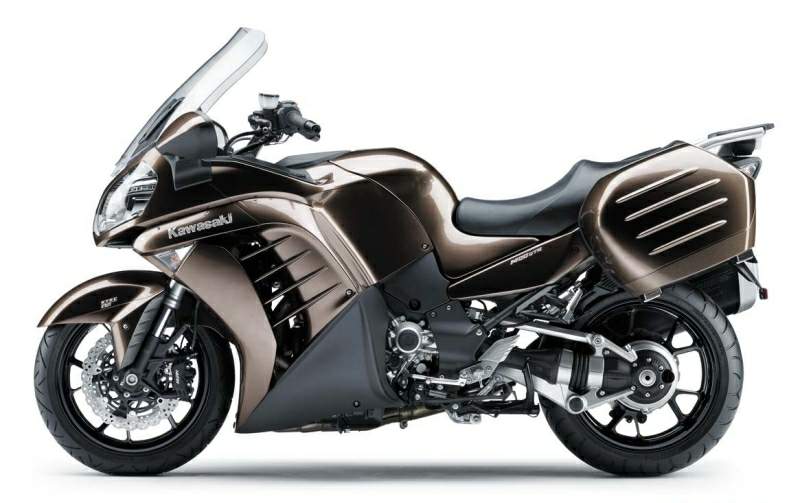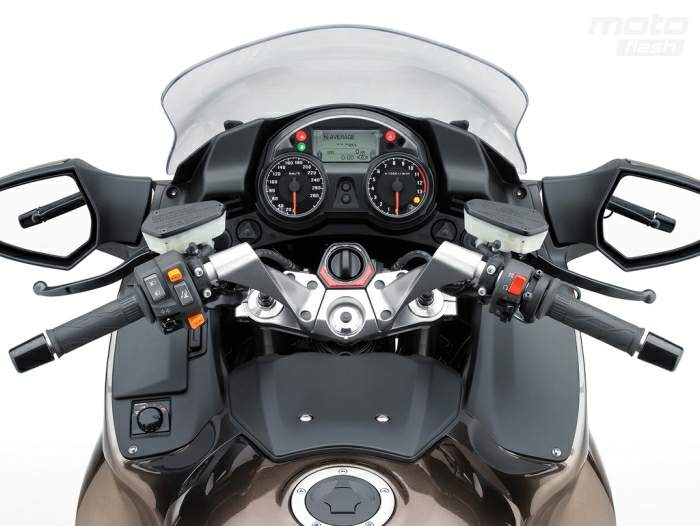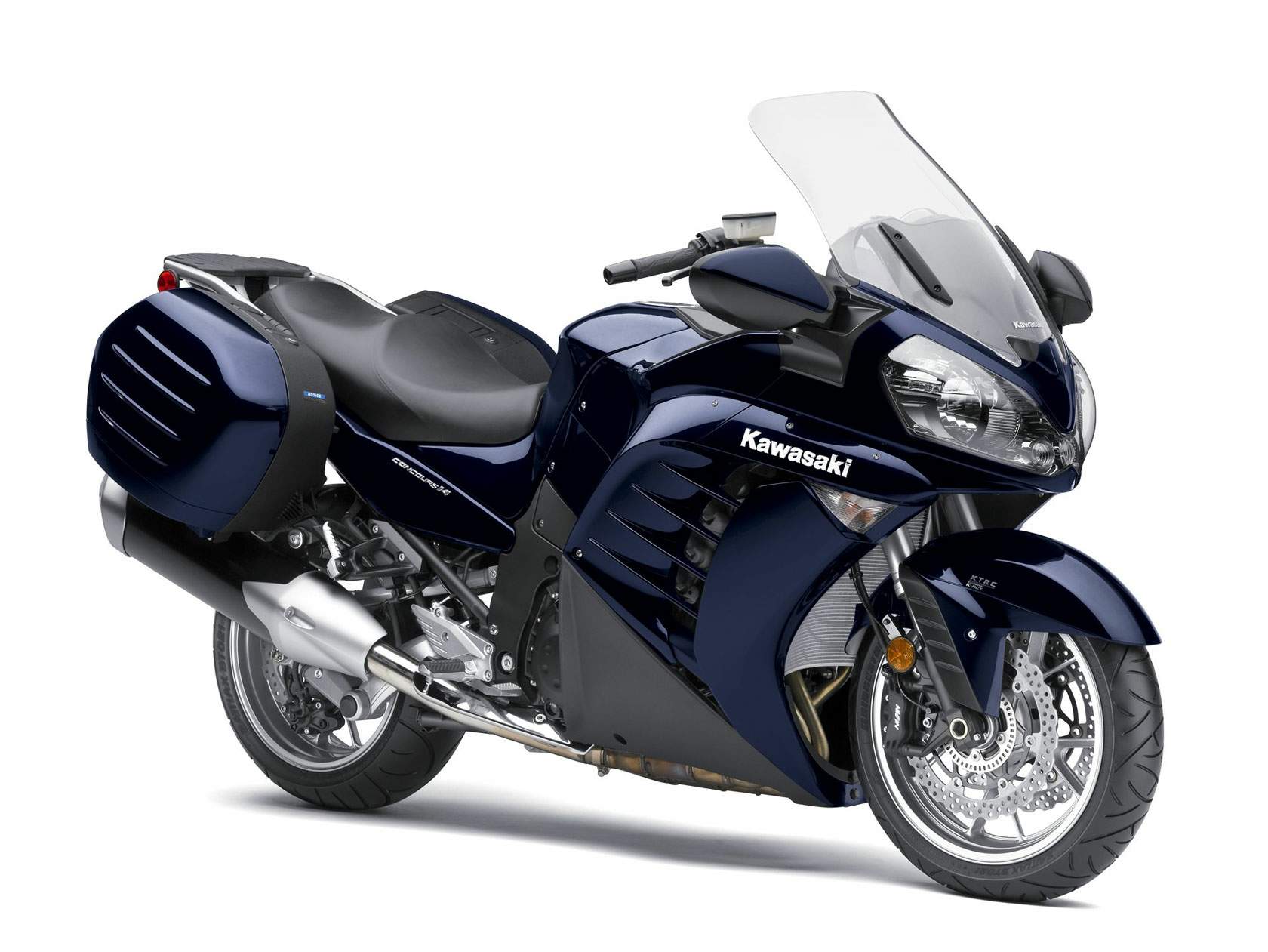
Make Model | Kawasaki GTR 1400 Concours |
| Year | 2010 |
| Engine | Liquid cooled, four stroke, transverse four cylinders, DOHC, 4 valves per cylinder |
| Capacity | 1352 |
| Bore x Stroke | 84 x 61 mm |
| Compression Ratio | 10.7;1 |
| Induction | Fuel injection |
| Ignition / Starting | Digital / electric |
| Clutch | Wet multi-disc manual |
| Max Power | 114 KW 155 hp @ 8800 rpm |
| Max Torque | 136Nm 102.0 lb-ft @ 6200 rpm |
| Transmission / Drive | 6 Speed / shaft |
| Gear Ratio | 1st 3.333 (50/15) 2nd 2.415 (41/17) 3rd 1.900 (38/20) 4th 1.545 (34/22) 5th 1.292 (31/24) 6th 1.074 (29/27) |
| Frame | Monocoque pressed aluminum |
| Rake / trail | 26.1 degrees / 4.4 in. |
| Front Suspension | 43mm Inverted forks with top out spring, Rebound damping TBA, 113mm wheel travel. |
| Rear Suspension | Bottom link Unit-Trek with gas charged shock, Tetra lever rebound damping TBA, 136mm wheel travel. |
| Front Brakes | 2X 310mm discs 4 piston calipers |
| Rear Brakes | Single 270mm disc 2 piston caliper |
| Front Tyre | 120/70- ZR17 |
| Rear Tyre | 190/50 -ZR17 |
| Seat Height | 815 mm / 32.1 in. |
| Wet-Weight | 308 kg |
| Fuel Capacity | 22 Litres |

The 2010 Kawasaki GTR1400 super-tourer’ now features restyled bodywork to offer more weather protection and comfort, a range of touring luxuries and options, tweaked suspension and Kawasaki’s new, second-generation linked ABS brakes.
But it’s the GTR’s new traction control system, dubbed ‘KTRC’ which is the most significant development. It’s the first time Kawasaki has fitted a genuine traction control system
The 2010 Kawasaki Concours 14 looks more striking than the old model thanks to much larger heat exhausts in the fairing. These come as part of a package of changes designed to better manage excess heat after many owners found their legs got cooked at low speeds. The new bikes also been crammed full of gadgets, with traction control and a fuel economy mode headlining those changes.

Enhanced Comfort & Touring Potential
A completely redesigned, more aggressive fairing with new inner guide surfaces and outlets is designed to facilitate heat dissipation, greatly reducing the amount of hot air transmitted to the rider
A 70mm taller windscreen with a wider upper portion reduces upper-body turbulence. The screen is electrically adjustable, with four new programmable preset positions
When the power is turned off, the windscreen goes to its lowest position. When the power is turned back on, the windscreens memory function returns it to the selected preset position
Passages from windscreen slits direct air through the inner fairing to vents next to the instrument panel; alleviating the lower pressure helps prevent turbulence around the riders head
An exhaust pipe guard added to the upper part of the exhaust mid-pipe helps protect the rider from heat when stopped
Stepless adjustable grip heaters are standard, with an easy-to-reach switch located in front of the new lockable storage case on the inner left fairing panel
A new, lockable storage case in the left fairing inner panel uses an electromagnet lock to prevent entry when the engine is off
New mirrors positioned 40mm higher increase rear visibility and provide increased hand protection from the wind
New hooks at the front of the tank facilitate securing a tank bag
New KTRC Traction Control (Concours 14 ABS only)
KTRC (Kawasaki Traction Control): Kawasakis first traction control system reduces engine output when wheel spin is detected, allowing the rear tire to regain grip
Advanced, 3-way control (airflow, ignition timing, fuel delivery) gives KTRC smooth operation, natural feel and the ability to operate on long stretches of bad road
KTRC adds no weight, since it uses the existing ECU and ABS sensors

New 2nd Generation K-ACT ABS (Concours 14 ABS only)
2nd Generation K-ACT (Kawasaki Advanced Coactive-braking Technology) ABS links front and rear brakes for most effective front-rear brake force distribution
A smaller, lighter K-ACT ABS unit with a higher-spec ECU is capable of more detailed calculations for smoother operation
The rider can choose one of two modes to suit riding situation or rider preference: The linked effect from front brake lever actuation is largely the same in both modes, but the linked effect when actuating the rear brake pedal is quite different
In Standard Mode, rider control is prioritized, with linked effect reduced at initial pedal stroke for natural sensation when sport riding
In High Combined Mode, theres a more pronounced linked effect from the beginning of the pedal stroke -- ideal for touring and two-up highway use. A low-battery mode maintains the ABS function as best possible when the battery charge is low. In low-battery mode, ABS timing and pressure relief functions are maintained, so brake effectiveness is preserved (although riders will notice that ABS operation is not as smooth). The K-ACT lamp will flash and "Low Battery" will be displayed on the LCD screen. The system resets when the engine is turned off
New Fuel Economy Assistance Mode
Activating fuel economy assistance mode changes the engine to a leaner map which prioritizes fuel economy, for as much as a 25 percent MPG boost.
Fuel economy assistance works in any gear, as long as rpm is below 6000, throttle opening less than 30 percent and speed less than 80 mph.
Improved KIPASS
Now each Concours 14 comes with one key fob (kept in a pocket) and a small card-type key for emergency/backup use.
The new card-type key includes an immobilizer function (but no remote activation) and is highly portable, measuring just 1.2 x 1.6 x 0.25 inch
Improved Finish, Higher Quality Design
Improved overall fit and finish results in a higher quality, more luxurious feel
A revised muffler end cap gives the silencer a more compact appearance; internal construction is unchanged, but the end cap itself is 1.6 inches shorter
Multi-function display now includes outside air temperature. The sensor is located at the intake duct (the furthest point from the engine)
Other new instrument functions include the K-ACT mode indicator, Economical Riding Indicator, and Fuel Economy Assistance Mode mark
The Mode-Select button on the front of the left grip lets the rider change LCD modes without taking his/her hand off the grip, toggling through average fuel consumption, instant fuel consumption, remaining range, tire pressure, battery voltage and outside temperature
New Accessories
Engine guards, a larger top case, tank bag, GPS bracket, a low seat and side spoilers join the list of authorized Kawasaki Accessories.
Motociclismo Ride impressions.
Thanks to the electronics, the 1400GTR has taken a big step forward this year. Kawasaki have listened to their customers and the result is that the bike now comes with second-generation ABS and a traction control system. The bodywork has been given a minor redesign for better dissipation of engine heat, the windscreen has been reshaped and its height has been increased by a bit, heated grips have been added, the glove compartment has been made more spacious and on-board computer can now be controlled via controls mounted on the handlebar.
The new 1400GTR’s chassis remains unchanged, but the suspension has been revised so that it works better with the bike’s anti-lock braking system. The new set-up works very well and is very communicative, and the bike feels very stable on the highway at high speeds. Of course, it’s a heavy bike (304kg claimed kerb weight) and you have to be careful with how you maneouver it at lower speeds and while suddenly braking hard.
Kawasaki’s K-ACT combined braking system, with ABS, works very well and with the bike fully loaded, provides powerful stopping performance from the twin 310mm front discs and single 240mm rear disc. While riding alone, however, and with the luggage bags removed (hence reduced weight), the ABS can be a bit more intrusive at times. The traction control also made a very positive impression – at no time does it cut in abruptly or suddenly interrupt the bike’s power delivery. It’s smooth and effective, allowing you to ride with more confidence on wet, slippery surfaces.
The Kawasaki 1400GTR’s 1,352cc inline-four remains perfect as ever – 155bhp and 136Nm of torque is a lot of power. But the engine is free from vibes and power delivery is smooth and consistent. Also, there is an eco mode that’ll help you get up to 10% better fuel efficiency, though performance suffers a bit. But it’s nice to be able to make that choice.

Post a Comment